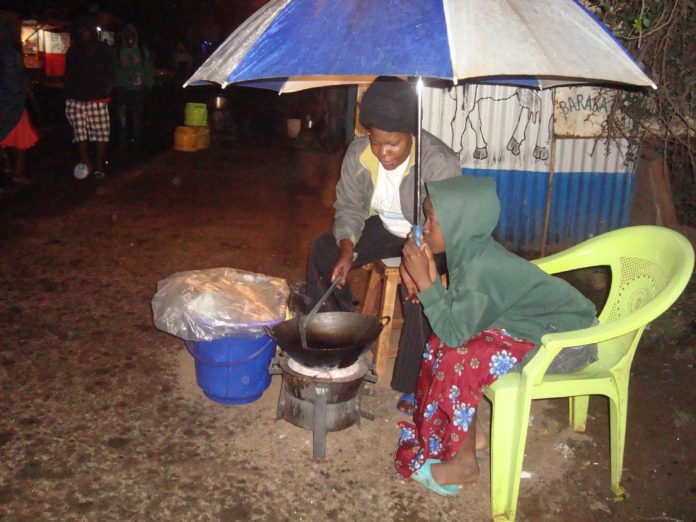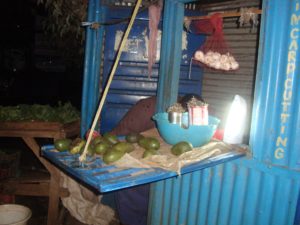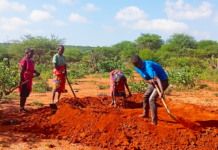By Mercy Odada
Women account for more than 50% of informal employment in trade, except in those countries where social norms restrict women’s mobility outside the home, world Bank reveals. Kenya is one such country with a high number of women in informal trade. Most of these women are involved in food business.
Selling food in informal settlements provides cheap meals and creates vital livelihoods, especially for women, but these providers are usually ignored and remain invisible.
Food vendors play a key role in nourishing their fellow residents in informal settlements, offering ready access to fruit, vegetables, snacks, and cooked foods. But, unlike food vendors in markets or downtown streets, vendors in informal settlements are often hidden and overlooked by policymakers .These people operate in areas where street lighting is poor especially during the night.
The vendors follow human traffic hence do not have structures with electricity. The lucky ones may get places near security lights but most tend to use their own means of lighting from kerosene lamps and sometimes candles.
Lack of lighting
Mama Dorothy Owuor is one such vender. She has operated her fish business along Soweto Kibera Street for over five years. The area does not have proper lighting. Therefore for the longest time, Dorothy and her fellow vendors along the route have used kerosene lamps to light up the area. Kerosene lamps(koroboi in Swahili) made from a can of bug spray has several challenges like going off when it’s windy; it is also expensive buying kerosene as it adds to the cost of doing business hence minimizing profit. With the lamps, the vendors are forced to close early as soon as it became late for security reasons as the light from the koroboi is inefficient and dim.
One vendor, noted that their business sometimes was exposed to thieves especially when the koroboi lamps go off and they were not done selling their food stuff.
“Because of poor lighting one may give customers less or more change which is not good for business” noted Mary Wasike who sells vegetables along the street.
To find a solution to street lighting problems in the Nairobi slums like Kibera, some private organizations like, Adopt a Light in conjunction with the Nairobi County government launched a street lighting project in Nairobi Slums sometime in 2005, with Kenya Power and Lighting Company are supplying power the points.
According to the Adopt a Light Chairperson, Esther Passaris, the social economic benefits of the project are many and include improved security, reduced crime, enhanced economic activities, providing employment and enhancing a sense of self-esteem and confidence among the people.
However, the street lighting project is yet to cover most slums in Nairobi hence continued lighting problems.
Solar lamps
On the other hand, the vendors discovered solar lamps which have a better quality of power and did not require a daily budget for kerosene. However, the solar lamps were quite expensive considering the minimal daily earnings of the vendors.
Changes
To help navigate the cost problem, a section of women operating in the Soweto Kibera route decided to form Chama (Self-help groups) to help each of them buy the lamps.
“Sahizi naweza kufanya kazi mpaka saa tatu( now I can work until late )” said, Dorothy.
Another vendor Jane Kerubo noted that with the solar lamps she able to save more as she not worried about buying kerosene.
Wilfred Mokua who sells solar equipment in the Soweto area acknowledged that fact the street vendors are warming to the solar lamps to increase their operation time.
Though it may take a while for the street lighting problems to be solved, the women have found ways of operating the businesses without fear of darkness.
Many citizens in the rural parts of Western Kenya, where a study by University of California, Berkeley, and Innovations for Poverty Action found that electrification rates remained low at five per cent for rural households have adopted the use of solar.
Many households in this region have opted to use solar lamps to light their houses.















